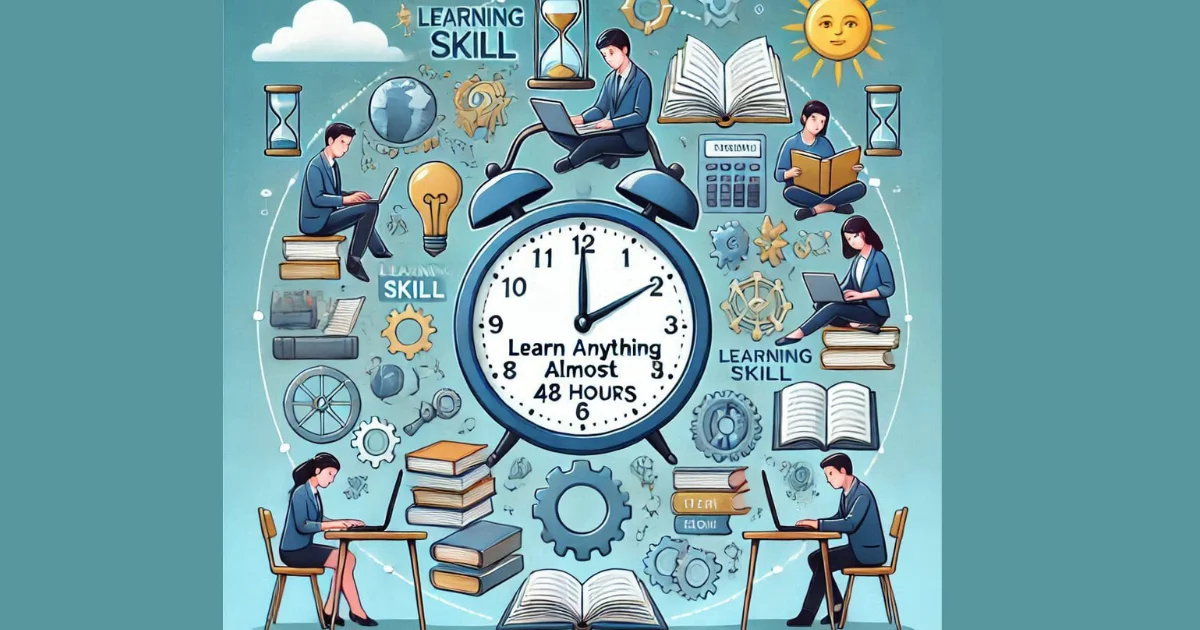Five Ways to Learn Anything Almost in 48 Hours
Learning rapidly is a great advantage in the fast-paced world of today. Four-time Australian memory champion Tansel Ali shares in his book, How to Learn Almost Anything in 48 Hours, potent strategies. His techniques fast-track speed learning by combining science-based methodologies, strategy, and attention. These five transforming techniques can help you to master any topic or ability in little time.
1. Empowerment of Focused Learning
Focus is among the most important lessons Ali’s book offers. Though it’s enticing, multitasking spreads focus and lowers output. Rather, Ali supports focused, undivided attention on one topic or talent.
Because focused learning lets the brain comprehend material deeply, it improves understanding and accelerates retention. Establish a distraction-free atmosphere by turning off alerts, setting up a quiet study location, and scheduling uninterrupted blocks of time. You will unlock faster and more effective learning by focusing all of your efforts on one goal.
2.Among the most potent strategies are:
Mind mapping is a visual tool for idea organization that links ideas via branching diagrams, therefore facilitating memory of knowledge and relationship viewing.
Mnemonic devices—acronyms, rhymes, or associations—help to make difficult material unforgettable. For instance, “ROYGBIV” helps one recall the rainbow’s hues.
Using this method of loci—memory palace—information is linked with certain sites in a familiar area thereby enabling rapid recall by mentally “walking” throughout the space.
3. Chunking and priority
Pursuing all at once learning is a surefire way to burn out. Rather, Ali stresses prioritizing, first stressing the most pertinent and vital material. This guarantees your working smarter rather than harder.
Chunking—that is, breaking down difficult subjects into smaller, more manageable pieces—helps to streamline the learning process. If you are learning a new language, for instance, concentrate on perfecting simple conversational sentences before plunging into grammar rules. This methodical process lowers overwhelm and increases confidence.
4. Active Learning Amid Passive Consumption
True mastery, Ali emphasizes, results from active learning rather than passive intake. Because they don’t really activate the brain, passive techniques like reading or listening are less successful for retention.
Among active learning strategies are:
Practice tests help you to evaluate your knowledge and point up areas of weakness.
Rewording content in your own terms helps you to understand it better and gives the work more personal quality.
One of the most effective approaches to confirm knowledge is to explain the subject to another person. Teaching helps you to remember ideas by simplifying and clarifying them.
5. Repeating certain phrases and interspersing them with others
Although it is a natural propensity for humans to lose information, we can resist this tendency by employing tactics such as interleaving and spaced repetition.
Memory can be improved by the use of a technique called spaced repetition, which includes reviewing knowledge at different points in time. The utilization of applications such as Quizlet and Anki could perhaps speed up this procedure for you.
Both the ability to solve problems and the development of neural connections are improved through the practice of switching between different subjects or talents while studying. If you are trying to learn photography, for example, you shouldn’t spend hours on a single topic. Rather of that, you should take turns learning about editing, lighting, and composition.
Conclusion
These techniques at Sphere Medium help improve memory retention by stimulating the brain.In conclusion, cramming isn’t necessary for rapid learning; what you need are focused strategies for effectively taking in and remembering new material. A guide to learning anything quickly, How to Learn Almost Anything in 48 Hours by Tansel Ali stresses the need of focus, remembering techniques, prioritizing, active participation, and reviewing previously learned material. Whether it’s a new language, an exam, or a hobby, these methods will make learning it easy and fast for you. Using these strategies immediately can allow you to learn a ton in as little as 48 hours!
Frequently Asked Questions about Storm Bert
1. Can I really learn something new in just 48 hours?
Yes, while mastering a complex skill or subject might take longer, you can learn the basics or make significant progress in 48 hours using focused learning techniques. The key is prioritizing essential information, staying disciplined, and using memory and active learning strategies.
2. How does focused learning improve my ability to learn quickly?
Focused learning eliminates distractions, allowing your brain to fully process and retain information. By concentrating solely on one topic or skill, you can achieve deeper comprehension and faster progress compared to multitasking.
3. What are some practical ways to practice active learning?
Active learning involves engaging with the material in a hands-on way. Some examples include:
- Taking practice tests to reinforce knowledge.
- Summarizing concepts in your own words.
- Teaching the material to someone else to solidify your understanding.
4. What is spaced repetition, and how does it help with learning?
Spaced repetition is a technique where you review information at gradually increasing intervals. This method strengthens your memory and ensures you retain knowledge over time. Apps like Anki or Quizlet can help automate spaced repetition.
5. How do memory techniques like the method of loci or mind mapping work?
Memory techniques create strong mental associations, making it easier to recall information.
- The Method of Loci: Involves associating facts or concepts with specific locations in a familiar space, like a mental “walkthrough” of a memory palace.
- Mind Mapping: A visual tool that connects ideas through branching diagrams, helping you see relationships and organize information for better recall.
Expert Graphic Designer | Social Media Marketing Strategist | Content Writer
Specialize in impactful visuals, strategic social media campaigns, and SEO-optimized content.


